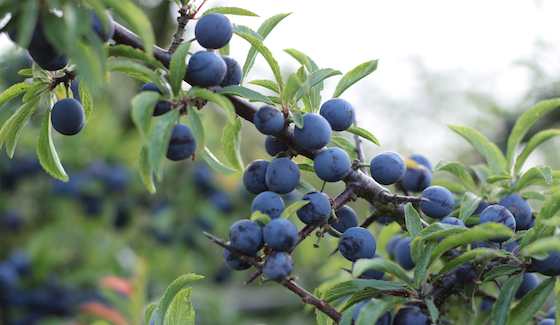By Sean Conway

Blueberry bushes are ideal for a sunny spot in your yard
Judging by my diet in the past week, the "season of blue" is upon us. The blueberry, midsummer's most celebrated fruit, is everywhere in abundance.
We are fortunate to have several local growers and roadside stands near our home selling blueberries, but nothing beats the taste of berries harvested right from bushes in your own back yard. The bushes are easy to grow and require very little work for the amount of fruit they produce. They can be grown in zones 3 thru 10, and if you select the right cultivars, the season can be extended from the beginning of the summer right through to the end.
Blueberries can be planted during the summer and fall, provided you keep them well watered. If you would like to grow a few bushes of your own, start by contacting your county extension agent for a list of varieties that perform best in your area. Next, select a site for your bushes by looking at how much sun you have. Blueberry bushes grow best in full sun but will tolerate a little shade. The more sun, the better the fruit production.
They prefer loose, well-drained soil with a pH of between 4.0 and 6.0, with 5.0 being ideal. Have your soil tested; if your pH is greater than 6.0, you will need to add amendments such as sulfur or iron sulphate.
Blueberry bushes will yield more fruit if multiple varieties are planted together to aid in cross-pollination. Bushes should be planted at least 4 feet apart to allow for growth, air circulation and room for pruning/picking.
Dig holes large enough to accommodate the root ball, and disturb it as little as possible when planting. Cover the top of the roots with 3 to 4 inches of soil and leave enough room to mulch an area 2 to 3 feet around the plant, being careful to keep the mulch away from the crown of the plant. (The crown is the area where the shrub's stems meet the soil.)
Mulching blueberries is important for several reasons. It helps retain moisture during hot, dry weather; it also reduces weed competition and improves soil structure when it decomposes. Pine sawdust, pine shavings or shredded pine bark make excellent choices to mulch your plants, as they also help acidify the soil when they decompose.
Blueberries have shallow root systems, sometimes with depths as little as 18 inches. It is important to keep newly planted blueberry bushes well watered, especially during their first summer.
Once established and well mulched, they are able to tolerate hot, dry weather better, but periodic watering during dry spells will greatly reduce the stress on even established plants and allow them to produce more fruit. On average, they prefer to have 1 to 2 inches of water per week for optimum growth.
Drip irrigation works well for blueberries, as it keeps foliage and fruit dry, reducing molds, which can cause fruit to drop.
Blueberries should be fertilized once a year in early spring before they begin their annual growth. Fertilizer formulated for acid-loving plants works well, such as an azalea fertilizer. Be sure not to apply too much fertilizer, and distribute it evenly within the root zone.
Blueberries need pruning once they are established but should be left alone for the first four years, while they mature. Once they are mature, a light annual pruning will increase yields and keep the bushes healthy.
Shrubs should be pruned in late winter before new growth begins. Start by removing any dead wood. Blueberries produce fruit on the previous years growth, so a good amount of strong growth from the previous year is desirable. Keep plants fairly open by removing any branches that no longer produce vigorous young shoots, but be careful not to be overly zealous. Blueberries like a fair amount of canopy growth.
If you have a sunny spot in your yard, why not plant a few blueberry bushes? You'll enjoy the "season of blue" for years to come.
Available at Amazon.com:
Cut Your Energy Bills Now: 150 Smart Ways to Save Money & Make Your Home More Comfortable & Green
It's Easy Being Green: A Handbook for Earth-Friendly Living
Sean Conway's Cultivating Life: 125 Projects for Backyard Living
© SEAN CONWAY. DISTRIBUTED BY Tribune Media Services
AUTOS | HOBBIES | EDUCATION | FAMILY | FASHION | FOOD & RECIPES | HOME DECOR | RELATIONSHIPS | PARENTING | PETS | TRAVEL | WOMEN
Home & Garden - Blueberries From Your Own Backyard